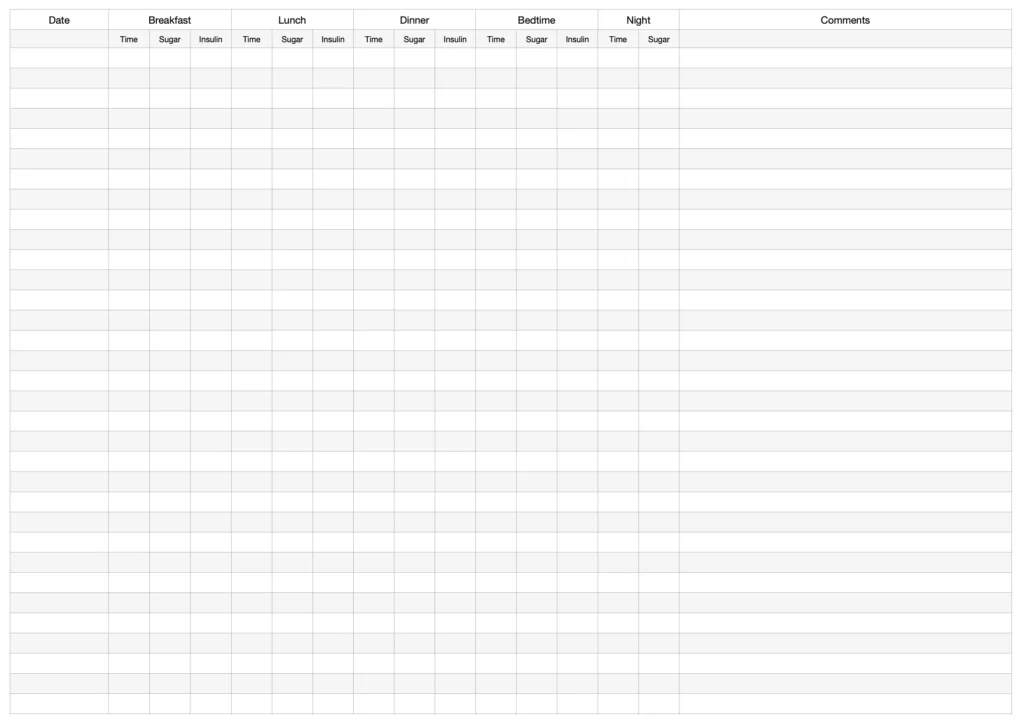In order to be in control of your life, managing your diabetes to reduce further complications, you must understand how to manage the disease.
Understanding and managing your diabetes and how your body responds to changes in food, activity, stress, and medication will help you better control your blood sugar. To see if there are trends or patterns in your blood sugar levels when they are out of target range, you must keep a detailed record of your blood sugar levels. Self monitoring of blood sugar is necessary and central to the effective treatment of diabetes. At diagnosis, your blood sugar results help you and your diabetes care team design the right diabetes care plan (meals, exercise, and medications) for you.
As you continue to live with diabetes, it is self-monitoring that tells you how well your diabetes care plan is working. Reviewing your blood sugar record will help you identify trends or patterns in sugar levels that are out of your target range. You will be able to determine what causes high and low blood sugar in your body. Together, with your diabetes care team, you will adjust your diabetes care plan so that you can bring blood sugar levels back into target range and maintain better blood sugar control. Knowing how and when food and stress raise blood sugar as well as how and when exercise and medications (diabetes pills and/or insulin) work to lower blood sugar will put you in charge of your diabetes.
A study by the International Diabetes Center in Minneapolis, Minnesota, showed that if almost half of your blood sugar readings fall within your target range, you can achieve an A1C (A-one-see) level of less than 7.5%. A1C is a blood test that is done by a member of your diabetes care team. It reflects your overall blood sugar level for the past 2 to 3 months.
There are five steps to follow that will make managing your diabetes, and keeping your blood sugar within your target range, and reduce your A1C a lot easier.
A blood sugar log, like the following, can help you keep an accurate and detailed record.

Adjustments you can make to your diabetes care plan to keep your blood sugar within recommended target range include changes to your medications (diabetes pills and/or insulin), activity (type of exercise, intensity, and duration), and meal plan (kind of food, amount, and time eaten). To understand the effects of medication, exercise, food, and stress on your diabetes control, you should check your blood sugar at specific times. Your doctor and diabetes care team will help you identify the best times to test your blood sugar. By checking your blood sugar regularly, you and your diabetes care team can identify patterns and trends in your blood sugar levels. Using this information, your doctor and diabetes care team can assist you in making adjustments to your diabetes care plan. The following chart suggests when to test your blood sugar to see the effects of changes in medication, exercise, food, stress, or illness.
| Event | Effect on Blood Sugar | When to Test* |
| Diabetes Medication | Decreases | Varies by type of medication |
| Exercise | Usually Decreases | Before and after exercise |
| Skipping/Delaying a Meal | Decreases | If you feel clammy, cold |
| Eating/Drinking | Increases | Before meals |
| Stress/Illness | Increases | During or after stress |
*You should test your blood sugar more often when there has been a change in your medication (increase, decrease, or switch), you are ill or under stress, or your normal daily routine has been changed (travel, etc.).
Accurate and detailed blood sugar records can help you and your diabetes care team identify patterns and trends in your blood sugar levels at certain times of the day or certain days of the week. Changes in blood sugar level can be caused by many factors, including medication, insulin, exercise, food, stress, and illness. Most often, insulin and food are the causes of problem patterns in blood sugar for people with diabetes. However because many factors can cause blood sugar to be too high or too low, it is important that you consult with your doctor and diabetes care team before making adjustments to your diabetes care plan.
After you and your diabetes care team have reviewed your blood sugar records and identified patterns in your blood sugar levels, you can decide whether or not adjustments to your diabetes care plan are necessary. Trends and patterns in your blood sugar levels indicate when and what kinds of adjustments should be made to your daily routine to better manage your diabetes. Your doctor will recommend changes in treatment that will help you get your blood sugar back within your target range. Slowly implement one change at a time to make sure of its individual effect on your blood sugar.
Keeping accurate and detailed records of your blood sugar levels and each change that you make to your daily routine will help you identify important patterns and trends. Blood sugar test results serve as guideposts in making the necessary adjustments to medication, activity, and food intake in order to achieve better diabetes control. In addition, a detailed blood sugar record can help you identify when your blood sugar is not within target range and when you should contact your doctor for help. Your blood sugar record can help your doctor determine the causes of changes in your blood sugar levels. Understanding what causes your blood sugar to rise and fall will help you, your doctor, and your diabetes care team make managing your diabetes a lot more effective.
Contact Us • Policies • Privacy • Terms
Ⓒ 2025 Vallient Medical, Inc. | All Rights Reserved